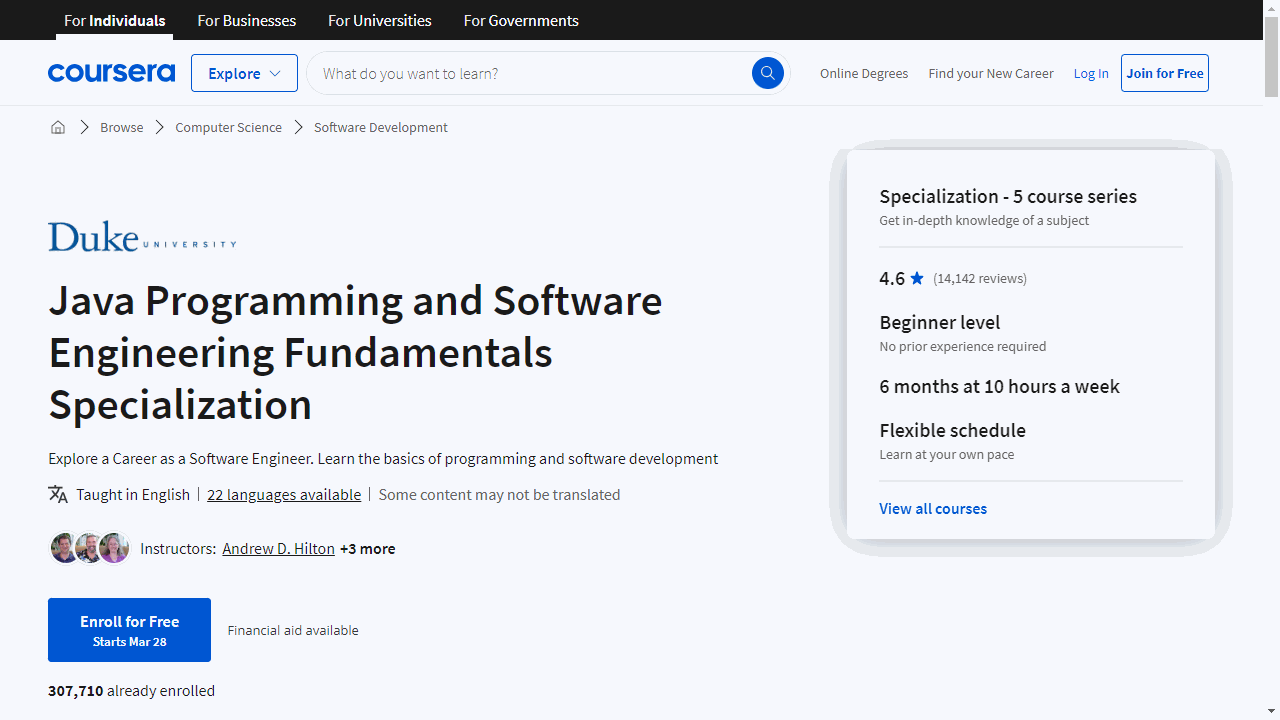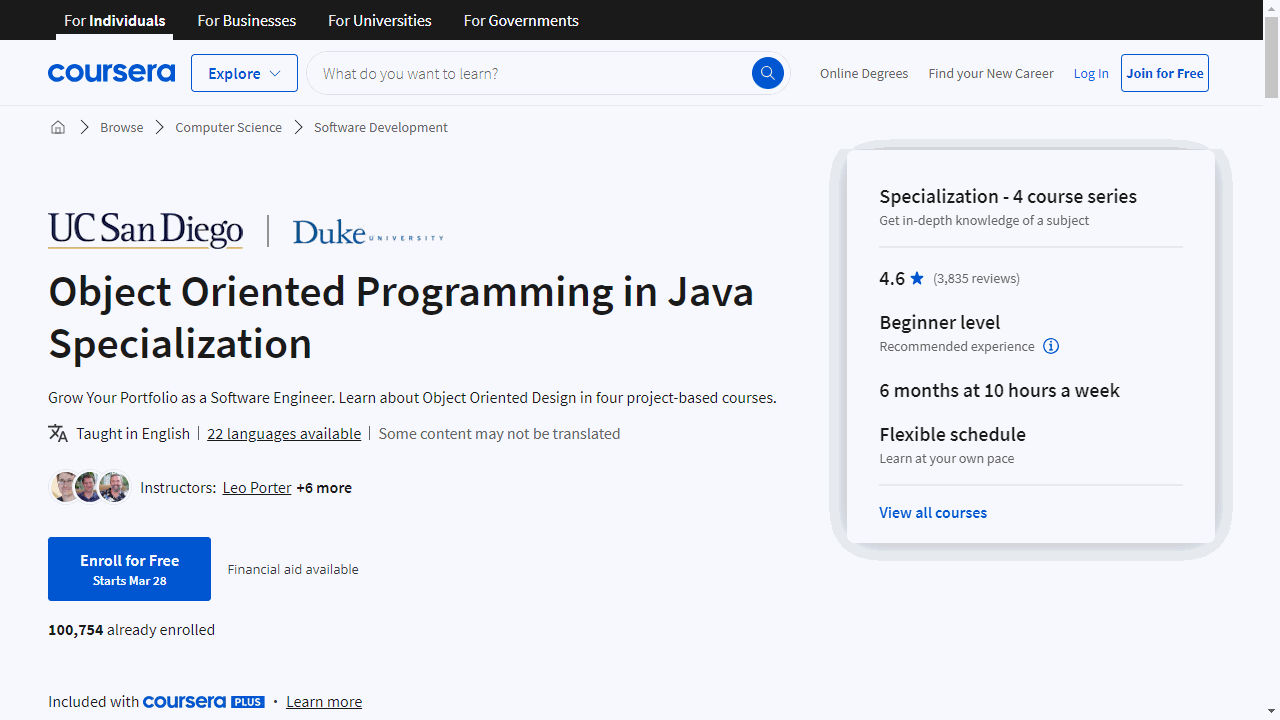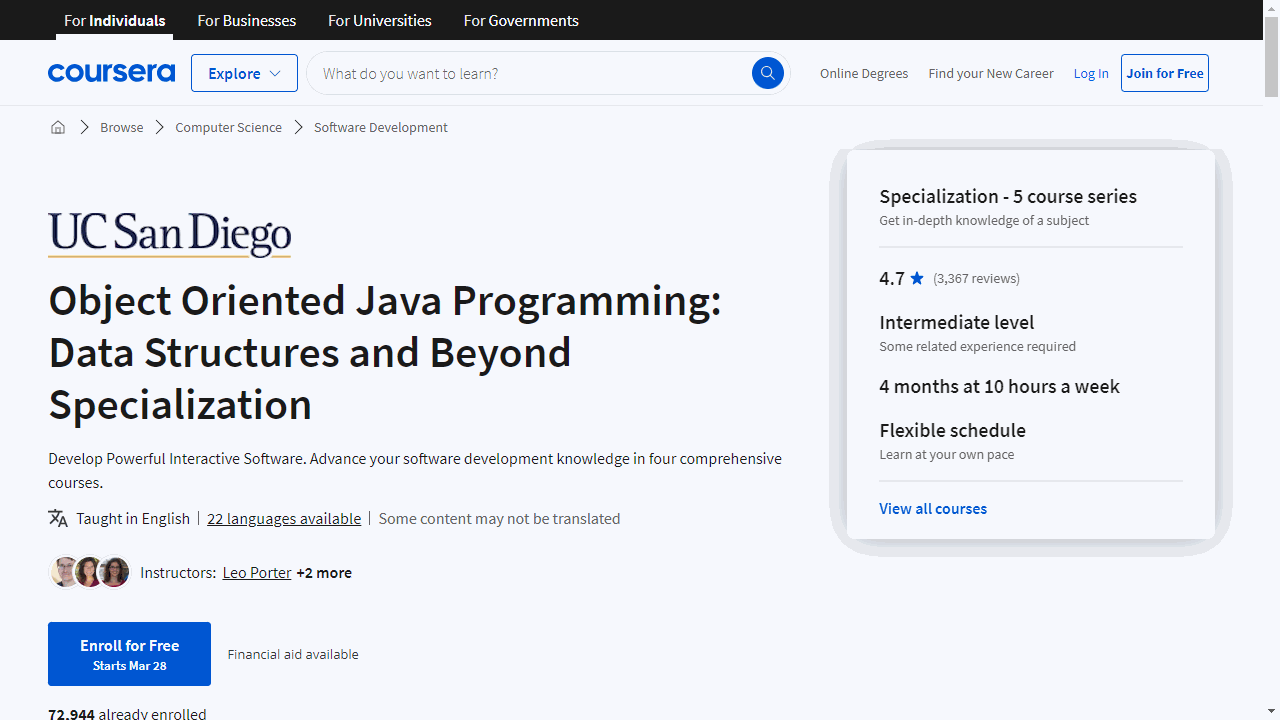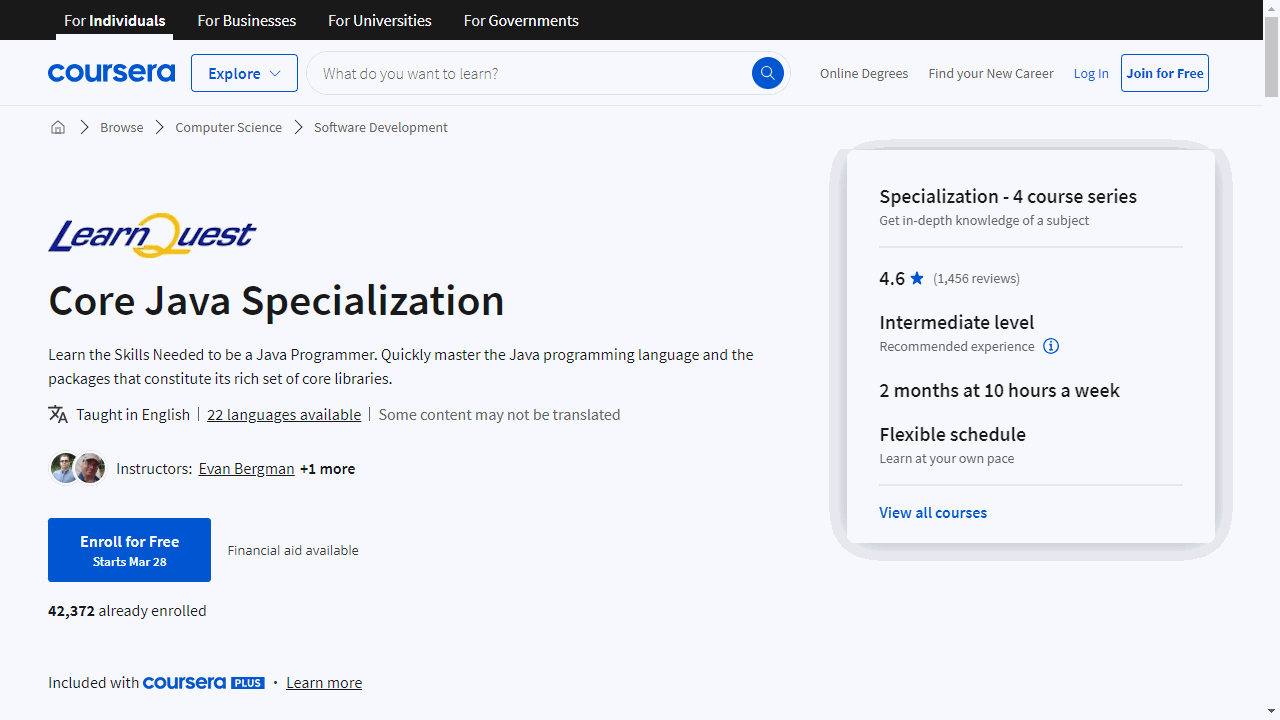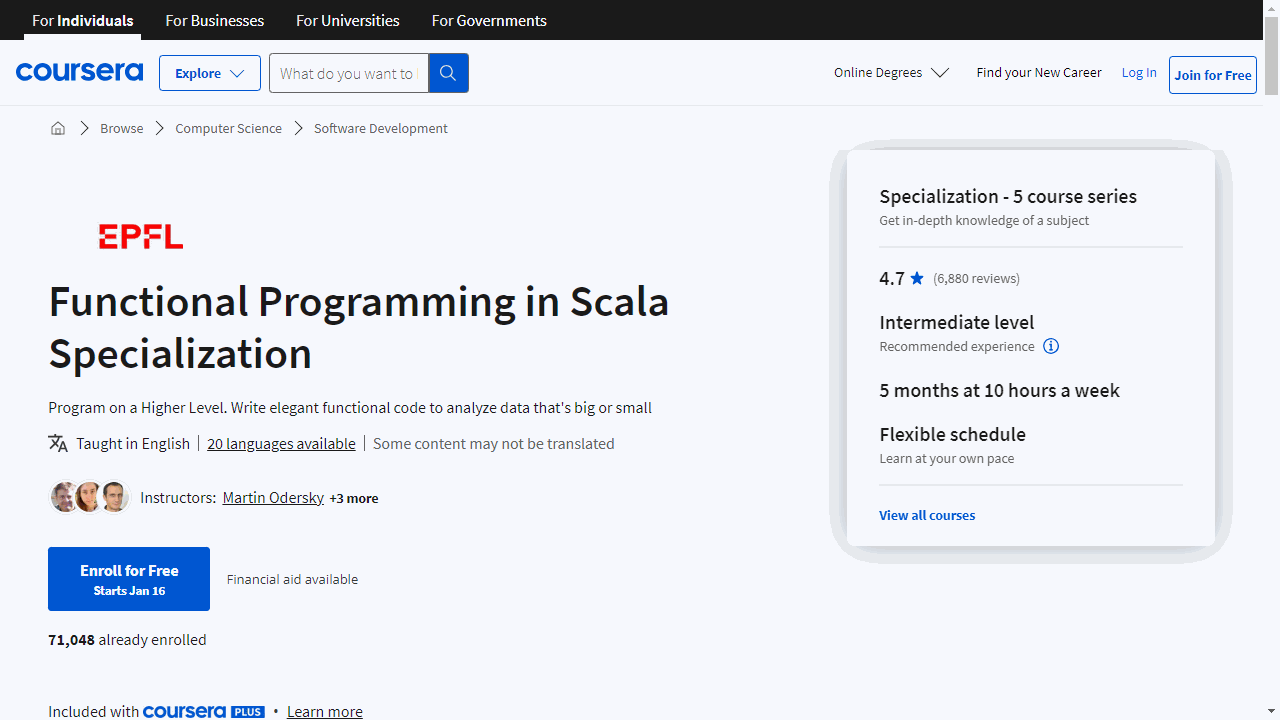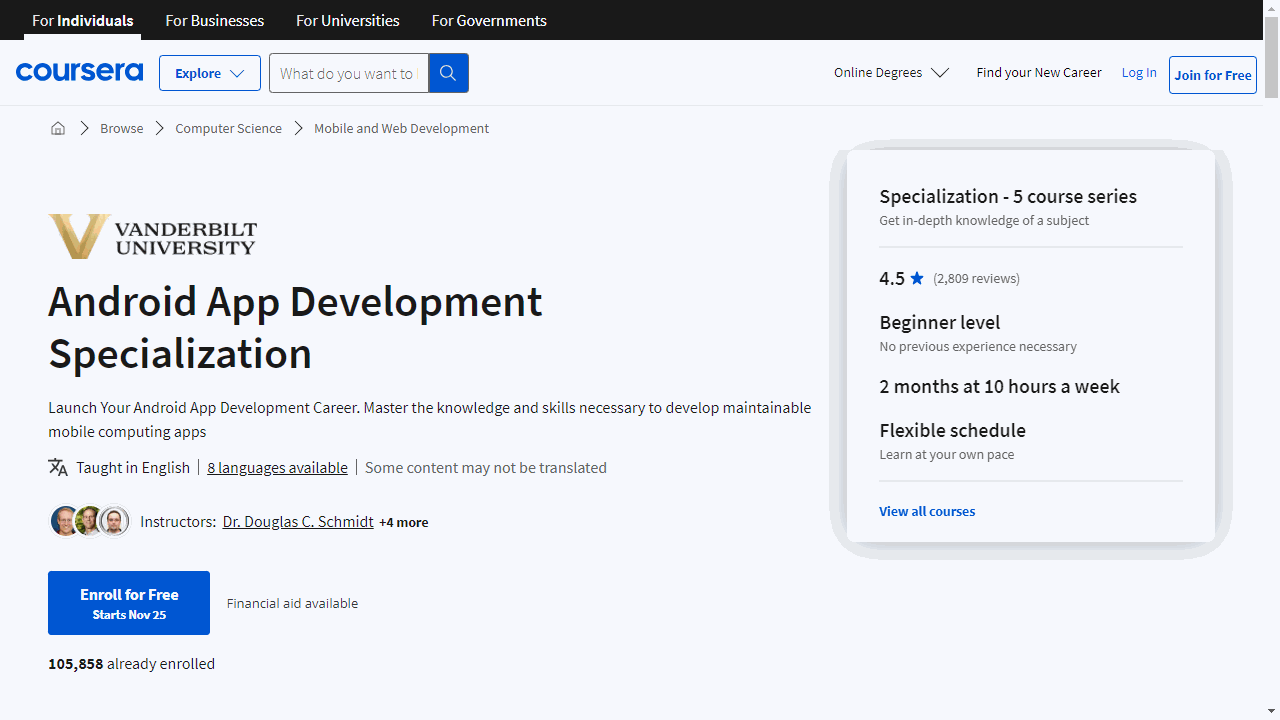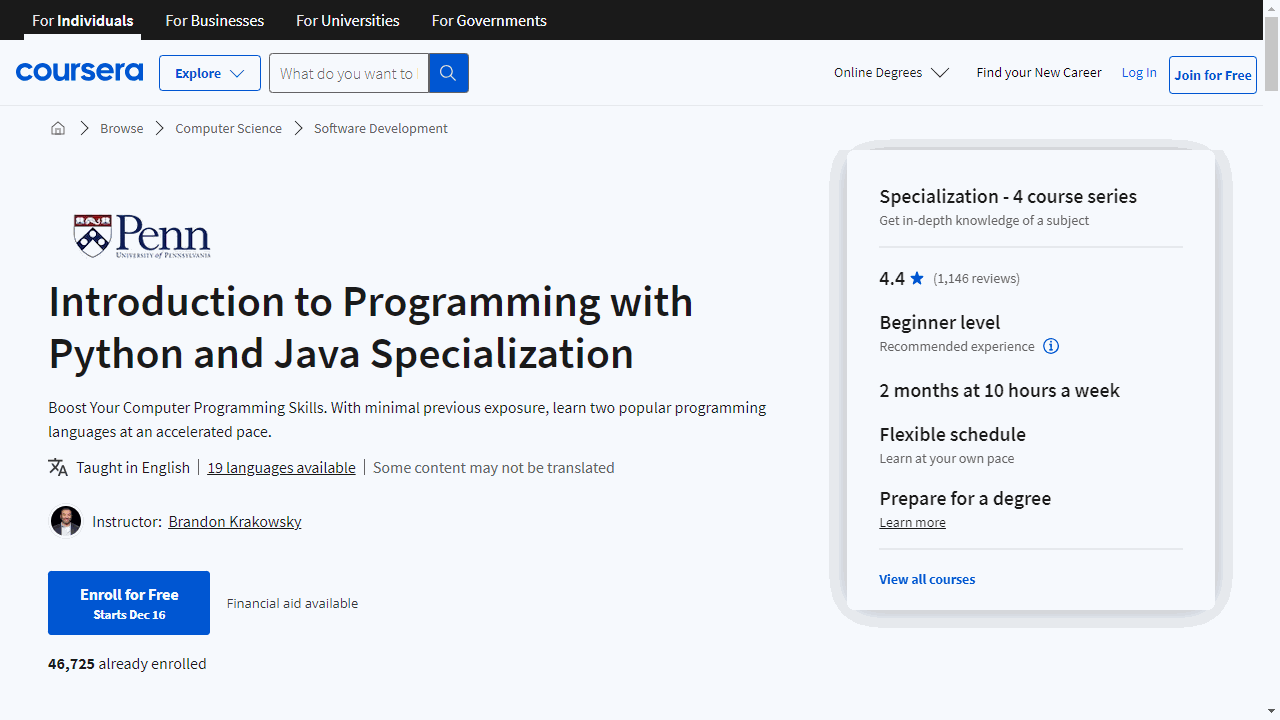Java is a versatile and powerful programming language widely used for developing applications across various platforms.
Mastering Java can open doors to exciting career opportunities in software development, web development, mobile app development, and more.
Whether you’re a beginner or looking to enhance your existing skills, learning Java can empower you to create innovative solutions and contribute to the digital world.
Finding the right Java programming course on Coursera can be challenging, with numerous options available.
You’re looking for a program that provides a comprehensive learning experience, covers fundamental concepts and advanced topics, and is taught by experienced instructors.
You want a course that equips you with the skills and knowledge to confidently build real-world applications.
For the best Java programming course overall on Coursera, we highly recommend Java Programming and Software Engineering Fundamentals Specialization from Duke University.
This specialization covers a broad range of topics, from basic programming concepts to building complex applications like recommendation systems.
It’s a comprehensive journey that equips you with a solid foundation in Java programming and software engineering principles.
The hands-on projects and practical exercises allow you to apply your learning to real-world scenarios, ensuring you graduate with valuable skills and experience.
While this specialization is our top recommendation, there are other excellent Java programming courses on Coursera.
Keep reading to explore more options, tailored to specific learning levels, career goals, and areas of interest within Java programming.
Java Programming and Software Engineering Fundamentals Specialization
This specialization from Duke University covers a wide range of topics, from basic programming concepts to building complex applications like recommendation systems.
You’ll start with the Programming Foundations course, where you’ll learn the fundamentals of programming using JavaScript, HTML, and CSS.
You’ll get hands-on experience with functions, loops, conditional statements, and building interactive web pages.
By the end, you’ll have created a web page that can apply image filters.
Next up is Java Programming: Solving Problems with Software.
Here, you’ll dive into Java programming, learning how to design algorithms, develop programs, and debug code.
You’ll work with custom open-source classes to manipulate images, websites, and data files.
The course culminates in building a program that analyzes baby name popularity over time using CSV files.
In Java Programming: Arrays, Lists, and Structured Data, you’ll level up your skills by learning data structures like arrays and ArrayLists.
You’ll use these to build more complex, object-oriented programs, including an encryption program and a program to break your own encryption algorithm.
The Java Programming: Principles of Software Design course teaches you how to solve real-world problems using multiple classes and interfaces.
You’ll analyze earthquake data, develop a predictive text generator, and learn about sorting algorithms, performance analysis, and Java APIs.
Finally, the capstone course, Java Programming: Build a Recommendation System, lets you apply everything you’ve learned.
You’ll create a simplified recommendation system similar to those used by Netflix and Amazon.
Using movie rating data, you’ll build a program that can parse data, calculate average ratings, determine user similarities, and recommend movies based on a user’s ratings.
Throughout the specialization, you’ll gain hands-on experience with Java programming concepts like data structures, algorithms, object-oriented design, software engineering principles, and working with real-world data.
The courses strike a balance between theory and practical application, ensuring you develop a solid foundation in Java programming.
Object Oriented Programming in Java Specialization
This specialization consists of four courses that will take you from the basics of Java programming to more advanced topics like data structures, algorithms, and object-oriented programming.
The first course, Java Programming: Solving Problems with Software, teaches you the fundamentals of coding in Java.
You’ll learn how to design algorithms, develop and debug programs, work with conditionals and loops, and use Java’s API documentation.
By the end, you’ll build a program that analyzes baby name data from CSV files.
In the second course, Java Programming: Arrays, Lists, and Structured Data, you’ll dive into data structures like arrays and ArrayLists.
You’ll learn to read/write data from files, perform data analysis, use collections like HashTables, and even write an encryption program.
The third course, Object Oriented Programming in Java, focuses on the core concepts of object-oriented programming (OOP) using Java.
You’ll create a Java program with a graphical user interface, leveraging existing libraries and implementing search/sort algorithms.
This project-based course is designed for those with prior programming experience.
The final course, Data Structures and Performance, explores advanced data structures like linked lists, trees, and hashtables used in industry applications.
You’ll analyze algorithm efficiency using Big-O notation and optimize programs for efficient data retrieval, insertion, deletion, and memory usage.
The project involves managing and manipulating large text datasets.
Throughout the specialization, you’ll gain hands-on experience with Java programming concepts like strings, the scientific method, open-source libraries, data visualization, cryptography, divide-and-conquer strategies, and object-oriented design principles.
The courses blend video lessons with coding assignments and discussion forums to cater to different learning styles.
Object Oriented Java Programming: Data Structures and Beyond Specialization
This specialization consists of five courses that cover a wide range of topics related to Java programming, data structures, and software engineering.
The first course, Object Oriented Programming in Java, introduces you to the fundamentals of object-oriented programming (OOP) in Java.
You’ll learn how to leverage existing libraries, build graphical user interfaces (GUIs), and implement core algorithms for searching and sorting data.
This course is project-based, allowing you to apply the concepts you learn to a practical project.
In the second course, Data Structures and Performance, you’ll dive into industry-level data structures like linked lists, trees, and hash tables.
You’ll learn how these data structures improve program efficiency and flexibility, and you’ll apply asymptotic Big-O analysis to evaluate the performance of different algorithms.
The third course, Advanced Data Structures in Java, focuses on more complex data structures like graphs.
You’ll develop, implement, and analyze algorithms for working with structured real-world data, such as route planning applications used by services like Google Maps or internet routers.
The fourth course, Mastering the Software Engineering Interview, prepares you for technical interviews by providing tips, examples, and practice opportunities.
You’ll work in teams to solve coding problems and receive advice on job searching and succeeding in a software engineering role.
Finally, the Capstone course allows you to analyze social network data by combining the skills you’ve learned throughout the specialization.
You’ll work with a real-world data set and have the opportunity to explore various aspects of social networks, such as identifying influential members or sub-communities.
Throughout the specialization, you’ll have access to video lectures, learner videos, student and engineer testimonials, and support videos, catering to different learning styles.
Another highlight of this specialization is that it teaches you using two popular Java IDEs, Eclipse and BlueJ, making you comfortable with industry-standard tools.
The courses are designed for learners with previous experience in software development or computer science, making them suitable for intermediate Java programmers looking to enhance their skills.
Core Java Specialization
This specialization consists of four courses that will take you from a beginner to an advanced level in Java programming.
The first course, Introduction to Java, lays the foundation by teaching you the basics of Java syntax, data types, expressions, operators, branching, and looping statements.
You’ll learn to write simple Java code and understand the benefits of using Java.
In the second course, Introduction to Object-Oriented Programming with Java, you’ll dive into object-oriented programming (OOP) concepts.
You’ll learn how to create Java classes, work with objects, import other classes, manipulate strings, and use advanced math functions.
This course builds upon the knowledge gained in the first course.
The third course, Object-Oriented Hierarchies in Java, takes your OOP skills to the next level.
You’ll gain a deeper understanding of inheritance and polymorphism, which are essential concepts in object-oriented programming.
This course will help you effectively implement and use these concepts in your Java code.
The final course, Java Class Library, covers advanced topics such as Java Generics, collections, file handling, and runtime error handling.
You’ll learn how to write reusable, type-safe code and explore the vast Java Class Library, which includes over 4,200 classes.
This course will prepare you to work with popular Java frameworks like Spring Boot and Jakarta EE.
Throughout the specialization, you’ll get hands-on practice and learn from experienced instructors.
The courses are designed for anyone interested in learning Java, including programmers, technical managers, and application developers.
However, some prior knowledge of software development in a procedural or object-oriented language is recommended.
Functional Programming in Scala Specialization
While not directly about Java, these courses cover important functional programming concepts that are being widely adopted in industry, including at companies like Twitter, Netflix, and Coursera itself.
The specialization starts with the Functional Programming Principles in Scala course, where you’ll learn the fundamentals of functional programming using the Scala language.
You’ll dive into recursion, pattern matching, higher-order functions, and immutable data structures.
This lays the foundation for writing purely functional programs and reasoning about them.
Next up is Functional Program Design in Scala, which builds on the previous course by teaching you how to design larger Scala applications using functional concepts.
You’ll explore topics like lazy evaluation, monads, and how to structure libraries.
Importantly, you’ll also learn techniques for dealing with mutable state in a functional way.
The third course, Parallel Programming, is where things get really interesting.
With multiple processors now common in computers and smartphones, parallel programming is becoming essential.
This course teaches you how to express algorithms in a functional style and solve them in parallel, using concepts like task and data parallelism.
In the Big Data Analysis with Scala and Spark course, you’ll learn how to manipulate big data distributed across a cluster using the Apache Spark framework.
You’ll see how the data parallel paradigm extends to distributed systems, and how to effectively use Spark for data analysis.
Finally, the Functional Programming in Scala Capstone lets you apply everything you’ve learned by building a large data-intensive application using real-world weather data.
You’ll transform raw data, create visualizations, and implement a reactive user interface.
The skills you’ll learn, like parallel programming, big data analysis, and functional design patterns, are highly valuable and transferable to other languages like Java.
Android App Development Specialization
The specialization kicks off with “Java for Android,” where you’ll master Java’s essential features and apply them to Android’s core components using Android Studio.
This course lays a solid foundation, enabling you to build apps with both robust functionality and intuitive interfaces.
As you progress to “Android App Components - Intents, Activities, and Broadcast Receivers,” you delve deeper into the Android framework.
You’ll learn to orchestrate various app components and manage data efficiently, all while getting hands-on experience with Git for version control.
The practical project involves creating an app that dynamically handles image data from the web, a skill that’s invaluable in the app development landscape.
In “Android App Components - Services, Local IPC, and Content Providers,” the focus shifts to the seamless operation of background tasks and data management.
You’ll piece together a stylish RSS reader app, integrating material design principles that not only ensure functionality but also enhance aesthetic appeal.
“Engineering Maintainable Android Apps” is where you’ll learn to future-proof your work.
The course emphasizes test-driven development, utilizing frameworks like JUnit and Robotium to maintain high-quality code.
It also introduces software patterns that promote clarity and extensibility in your app development process.
The culmination of this specialization is the “Capstone MOOC for ‘Android App Development,’” where you’ll synthesize your newfound knowledge by creating a unique app.
This final project is your opportunity to demonstrate your comprehensive understanding of Java programming, Android components, and testing methodologies.
With a commitment of just 10 hours per week, this specialization is designed to fit into your busy schedule, offering a hands-on, flexible learning experience.
Soon enough, you’ll find yourself ready to publish your own Android apps on the Google Play Store.
Introduction to Programming with Python and Java Specialization
Provider: University of Pennsylvania
This series of courses is crafted to elevate your skills in Python and Java, two languages that are highly sought after in the tech industry.
Kick off your programming journey with “Introduction to Python Programming.”
This course isn’t just an overview; it’s a deep dive into Python, where you’ll grasp essential programming concepts such as data structures and functions.
You’ll quickly move from learning the syntax to actively writing and running Python code, setting a strong foundation for your programming skills.
Move on to “Data Analysis Using Python,” where you’ll harness the power of Python for data science.
Here, you’ll get familiar with pandas, numpy, and matplotlib—tools that are vital for data analysis.
You’ll learn to manipulate and visualize data, answering real-world questions through hands-on exercises.
Shift gears to Java with “Introduction to Java and Object-Oriented Programming.”
Java’s robustness makes it ideal for a wide range of applications, and you’ll understand why as you delve into object-oriented programming principles.
You’ll practice writing Java code in Eclipse, a popular integrated development environment, and learn to test your code effectively using unit testing.
Finally, “Inheritance and Data Structures in Java” will deepen your Java expertise.
You’ll explore inheritance, a cornerstone of OOP that allows for code reusability.
You’ll also tackle Java’s data structures, learn to manage files, and refine your debugging skills with Eclipse’s debugger.
This course will enable you to write more sophisticated and efficient Java programs.
Each course is interactive, emphasizing practical coding exercises over mere theory.
You’ll emerge with the ability to write functional programs, analyze data, and debug code—skills that are in high demand.
Also check our posts on:
